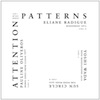 Important Records has fast become the finest outlet for minimalism I can think of, reissuing landmark recordings and providing a platform for works by new and established artists. This double LP produced in conjunction with Black Pollen Press celebrates the changing face of minimalist composition over the last four decades; two archive recordings and two new pieces showing how enthralling and detailed this kind of music can get.
Important Records has fast become the finest outlet for minimalism I can think of, reissuing landmark recordings and providing a platform for works by new and established artists. This double LP produced in conjunction with Black Pollen Press celebrates the changing face of minimalist composition over the last four decades; two archive recordings and two new pieces showing how enthralling and detailed this kind of music can get.
 
Important Records / Black Pollen Press
The two archive recordings form the first LP, one side devoted to Pauline Oliveros’ "Horse Sings from Cloud (Encore)" and the other containing Eliane Radigue’s "Biogenesis." Both these composers create music that is both powerful and personal but in utterly different ways. On a live recording from 1977, Oliveros (armed with her characteristic accordion) generates an earthy swarm of sound dictated by her simple, elegant score:
"…hold a tone until there was no desire to change the tone. When there was no desire to change the tone then it could be changed."
The long accordion tones are punctuated by Oliveros’ voice, deeply human music from a genre known for its abstraction. The concentration employed by Oliveros commands an equal amount of concentration from the listeners. Giving it (and the other three pieces that make up the appropriately titled Attention Patterns) the due attention they deserve makes for a fulfilling and rewarding experience.
From a purely stylistic perspective, Radigue’s "Biogenesis" (recorded in 1973) is a world apart from Oliveros’ piece. The electronic drones suggest a level of complete peace that transcends any normal human experience. While it does not quite come to the sublime, satoric bliss of her masterpiece Trilogie de la Mort, the singularity of Radigue’s compositional approach and its lack of artistic redundancy is remarkable. Interlocking motifs, muffled by amniotic drones eventually give birth to a pulse, a deep lub-dub of a heartbeat formed from the interaction between frequencies.
The second LP is given over to new works. Yoshi Wada’s "Reed Modulation" blows the calm of the first LP out of the stratosphere. A combination of reed intsruments and electronics, "Reed Modulations" fills the room and my mind to the point where the house could be burning down around me and I would not notice until the record melted. The rich, full and physical sound of the piece makes links with Oliveros’ accordion playing. Like Oliveros, the two Wadas (Yoshi is joined by his son Tashi on this recording) turn the music into an extension of their bodies.
Finally, Sun Circle finish off Attention Patterns with their ritualistic "For Yoshi Wada." Despite the dedication to Wada, this piece comes from the same place as some of Angus MacLise’s more trance-inducing recordings. Layers of mizmars and khaen (both reed instruments which do reflect Wada’s own choices in instrumentation) form hypnotic sheets of tones which are punctured by slow, booming percussion. This is completely at odds with the other three pieces on the album in terms of style and character but Greg Davis and Zach Wallace are definitely channeling something from the same inspirational and philosophical sources as Oliveros, Radigue and Wada.
In addition to the music, there is also a 48-page booklet filled with interviews, biographical information, photographs and liner notes. The interviews all tease out revealing information from the various musicians; the interviewer (Che Chen) is insightful and the responses from all parties make for fascinating reading. The entire package is housed in a stark, embossed white sleeve which contrasts beautifully with the black of the vinyl and the purple inks used to color the booklet. This is a perfect album which will no doubt be considered a classic in years to come.
 
Read More

